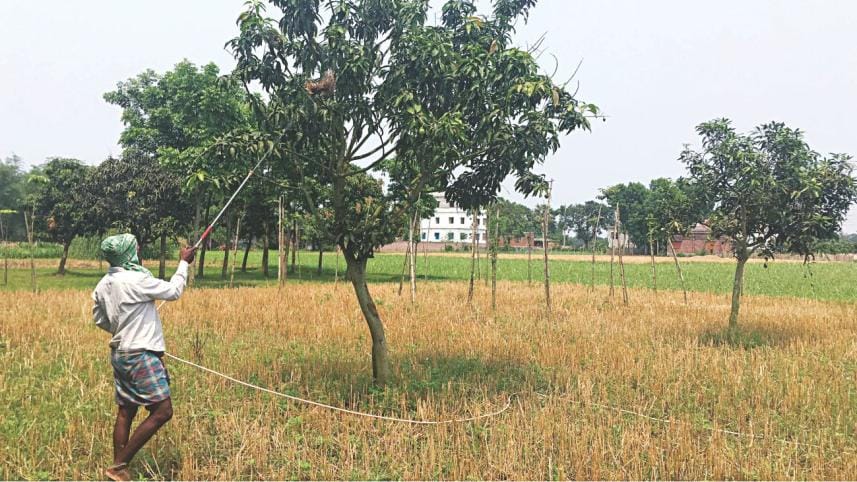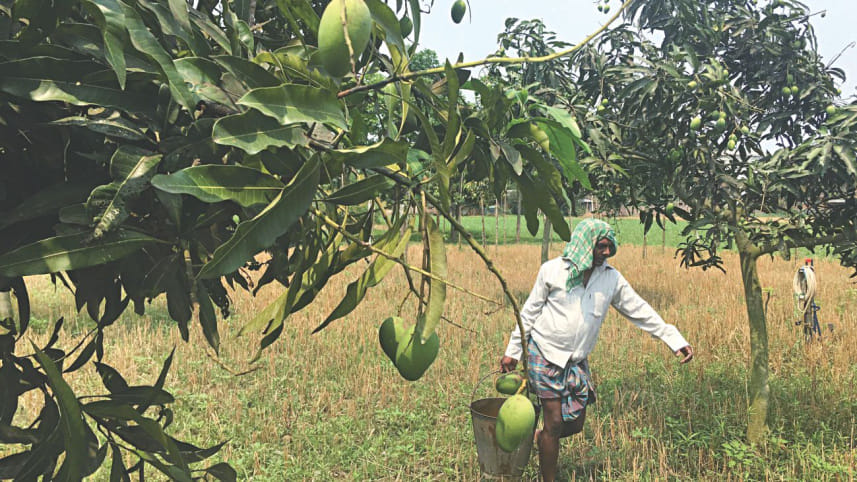Pesticides still being applied on mangoes

A number of mango growers are spraying toxic pesticides on their orchards in Rajshahi region, despite a High Court order to deploy police in the areas to prevent the harmful practice.
Following the order delivered on April 9, local administrations of Chapainawabganj, Rajshahi, Natore and Naogaon have begun monitoring the orchards.
But the growers say they are using pesticides “to protect the orchards from diseases”.

During a recent visit to Rajshahi’s Sheikhpara, which is well-known for having a couple of 100-year-old mango orchards, this correspondent found that mango grower Abdul Jabbar was preparing chemicals for spraying on his trees.
Jabbar said most of his trees were not bearing fruits this year. Besides, his fruits came under attack from pests.
“Mangoes are falling from the trees and leaves are drying up due to pest attack,” he said, adding that spraying pesticides was essential to save the fruits.
The grower of the juicy fruit claimed that he was using the pesticides on the advice of agriculturists. “Police are frequently visiting the orchards and we are finding it difficult to make them understand that chemicals are necessary.”
He said rain during flowering and fruiting damaged fruits. Some fruits were also destroyed by storms. “Now we are trying to protect what we have.”
Md Alauddin, who looks after a part of a mango orchard on 70 bighas of land in the area, said most of his 200 trees were not having fruits this year. “Good varieties of mango trees -- Gopalbhog, Khirsapat and Langra -- barely bear any fruit. The fruits have been attacked by pests. It has become mandatory for us to use the pesticides.”
Deb Dulal Dhali, Rajshahi regional additional director at the Department of Agricultural Extension, said those chemicals were highly toxic.

Effects of some of the pesticides remain active for two weeks and the others for a month. Consuming the fruits on which the pesticides are used before the stipulated time is harmful for humans, he said.
Mangoes will start ripening at the end of the ongoing Baishakh, the first month of the Bangla calendar.
Sorof Uddin, senior scientific officer at Bangladesh Agricultural Research Institute, who has been transferred to Moulvibazar from Chapainawabganj, said mangoes faced several natural calamities this season. The unusual rain during fruiting in late February and early March damaged many buds and then nor’wester and hailstorm struck, he added.
“At that time, some pests attacked mangoes and we advised the growers to use the prescribed pesticides only. But in case of no attacks, they don’t need to worry about it.”
“If mango farmers go for organic farming, including fruit bagging, they will not have to use harmful chemicals,” he added.

Local administrations and agriculture officials said any kind of chemical use would be illegal after the HC order. But when the officials were going to visit the mango orchards, they were barely able to take actions against the pesticide users, witnessing the condition of fruits.
“We asked them [mango growers] to stop using chemicals after the court order,” said Deb Dulal Dhali.
On April 9, the HC ordered the Rajshahi divisional commissioner and the deputy inspector general of police of Rajshahi range to deploy magistrates and police to the region’s mango orchards to check the use of chemicals on the summer juicy fruit.
On Tuesday, the Supreme Court rejected an appeal filed by the state, seeking stay on the HC order.
Rajshahi range police DIG AKM Hafiz Akhter told The Daily Star that they began taking actions as per the HC order.
He said the issue was discussed at Monday‘s divisional coordination meeting with the divisional commissioner in the chair. Police and civil administrations of the districts producing mangoes, especially Chapainawabganj and Rajshahi, were asked to deploy vigilance teams to mango orchards with immediate effect.
“We must follow the directives of the country’s top court. We asked the police to work under magistrates to prevent the chemical use on mango orchards. And we have learnt that the vigilance has already begun,” the DIG Hafiz said.
Asked how the administration would keep watch on the mango orchards spreading over vast areas, the DIG said the local administration and police would jointly find out a strategy. “The main focus of the HC order is to prevent the use of hazardous chemicals on mangoes and we are determined to comply with it.”
Contacted, Rajshahi district’s Deputy Commissioner SM Abdul Kader said he had already assigned magistrates in every upazilas to monitor the orchards. He said police teams under a magistrate would watch the orchards regularly.
“Mangoes are still small in size. Magistrates and police began working together in every upazila,” he said.
The Department of Agricultural Extension increases the target of mango cultivation and production every year, but following the natural calamities this year, it kept the target the same as last year’s.
Last year, 8,66,361 tonnes of mangoes were produced on 70,361 hectares of land in four districts -- Chapainawabganj, Rajshahi, Natore and Naogaon.
Officials said the use of chemicals in that region had been rampant before and it has been reducing since 2015 when the export of mangoes began.
Those who are still using chemicals need proper counselling and awareness, they added.




 For all latest news, follow The Daily Star's Google News channel.
For all latest news, follow The Daily Star's Google News channel.
Comments